Let me begin this column by saying I’m a loser. I lost the seat I was running for in the 2014 election. When all the votes were counted, I came up short. However, when I look back at my campaign and all that has happened since, our religious community won in many ways. You see, I didn’t lose because I’m Pagan, even though I was subjected to a smear campaign based on religion. I lost for very normal, boring reasons and that, in itself, is a victory we can celebrate. I’d like to challenge our religious community to do better, if you feel called to do so. To run and to win.
Cara Schulz, during a day or door knocking
If you want to serve your gods, your local community, and protect our religious rights, run for local level political office. Yes, it’s daunting, expensive and time consuming. Running for office will exhaust you in body, mind, and spirit. It will take time away from your family, and you’ll miss out on fun social events. And yes, your opponents will use your religion against you and it will be brutal. Fair or unfair, people will judge every Pagan in the world by what they see you do and what they hear you say.
After going through all of that, if you’re running against an incumbent you’ll have about a 10% chance of winning. If this is your first time running for office, even if there isn’t an incumbent to run against, you have a less than a 25% chance of winning.
Run anyway.
Consider running for a school board seat or a city council position or some other similar office. Local politics affect your daily life far more than anything that happens in Washington D.C., and it’s where you can have the greatest impact in your community.
Think about all the stories of religious discrimination toward Pagans we’ve heard over the past few years and consider where that discrimination was taking place. In 2014, we saw a school board favoring Christian prayers to open meetings and refusing to allow a Pagan to give the invocation. City officials in Bebee, Arkansas tried to run a Pagan family and business out of town. The town of Catskills, NY forced the Maetreum of Cybele into a lengthy court battle costing tens of thousands of dollars because local officials didn’t see the Maetreum as a “real” religious house.
Those are just a few cases where local politicians used their power and authority to discriminate against Pagans. How much more effective could you be sitting on one of those school boards or city councils, rather than being the person asking those in power to stop infringing on your rights? Being the person in power, rather than the supplicant?
The other benefit to running is in changing peoples’ perceptions on Pagans and Paganism. As more people come to know Pagans, or work with Pagans, or see them doing things such as run for office, the less they will be influenced by sensationalist or mocking narratives. The more of us who are “out” and achieve positions of respect and authority, the safer it is for all of us.
The amazing recent victories for lesbian, gay, bisexual, and transgendered individuals have only come after decades of “coming out” because they understood that putting a human face on their communities was the only way forward. Likewise, modern Pagans, whatever their faith or practice, need to engage in the work of putting a human face on our religious movement. Thanks to some brave pioneers and visionaries we’ve already come a long way, but the next steps come only when it becomes apparent that we truly are everywhere, that we are indeed your brother, sister, parent, child, co-worker, partner, or friend. – Jason Pitzl-Waters
Should you run for office?
To judge if running for office is something you should consider, let me relate my experience running for a council seat for Burnsville, Minnesota as a very out of the closet Pagan. It goes without saying that you need to be very public in your religious affiliation. Even if you use a craft name or a pseudonym, if you aren’t already fully out, someone will out you. This happened to candidate Alice Richmond when she was outted on a live radio interview in 2009.
First, I did my research. Burnsville is a large city, the 9th largest city in Minnesota. There were two seats available and both incumbents were running for reelection. The city charter is set up so that all candidates run, and the top two vote getters win the seats. I looked at how much money each candidate spent on previous elections. I also looked at how many persons are in my area and how many of them are voters. This is important for calculating man hours needed to knock on each door. I calculated how many volunteers I would need and how many hours I needed from each volunteer. That’s the normal stuff every candidate does.
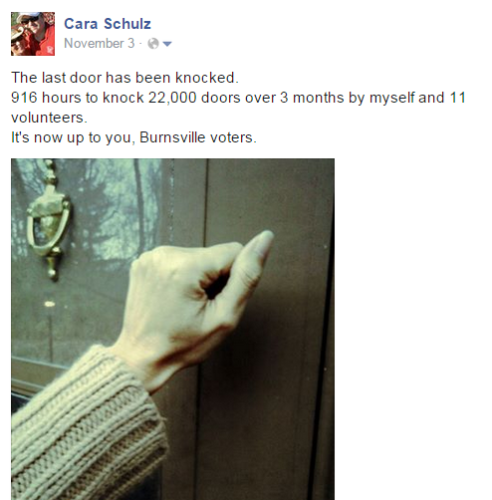
I finished my last few days of the campaign, door knocking with a stress fracture in one of my feet
But remember, you will not be a normal candidate, and you will need to make preparations other candidates don’t have to devote time and resources toward. You will need to make a plan for what happens when, not if, your opponent uses your religion against you. This plan goes into effect on day one of your campaign.
I had a short discussion with each one of my volunteers, supporters, and donors about my religion, if they didn’t already know. It went something like, “I just want to let you know that I’m part of a minority religion and sooner or later my opponents will attempt to use it to smear me. My religion is Hellenismos, and it’s a modern version of what ancient Greeks such as Socrates practiced. It’s very family focused and encourages civic duty. If you have any questions feel free to ask me at any time. If you feel this is cause to withdraw your support, just say so and it will remain between you and me.”
I kept it simple and used cultural concepts most anyone could immediately understand. Although I had people ask me a few questions, I didn’t have a single person or organization withdraw support. As I was calm and treated it casually, the people that I talked to treated it the same way. Months later, when the expected #politricks hit, these were some of my strongest supporters.
I googled myself and viewed all the photos I could find of myself on the internet. I looked at each one with fresh eyes. If a section of this blog post was quoted in the paper or this photo was put on a flyer, how would I react? How do I put it into context for people entirely unfamiliar with Paganism, using only one sentence?
I spoke with trusted non-Pagans for quick, professional, and reasoned thinking, and asked them if they’d be willing to help me when my religion would be brought into the campaign. They would be prepared to comment on articles and social media, write Letters to the Editor, and call in to radio shows. Since I did this early in the campaign, these non-Pagan supporters were mentally prepared and were able to respond quickly when the situation arose months later.
I was also fortunate that other friends, whom I hadn’t approached, assisted me. I can’t stress how important it is to have diverse, non-Pagan support ready to respond to social and traditional media. A persuasive comment early on can change the entire direction of the conversation. Otherwise, the snowball of mockery and scaremongering starts rolling downhill and there’s no way of stopping it.
I spent some time, not as much as I should have, developing a working relationship with local media. If they’ve worked with you in the past and found you to be a reliable and sane person, they are less likely to run an article on you that is lurid or sensational. They may still write an article about your religion, but you have a better shot at it being fair and well researched if they know you as a person. During the campaign, I know of at least one reporter who passed on running an expose-style article about my religion before the election.
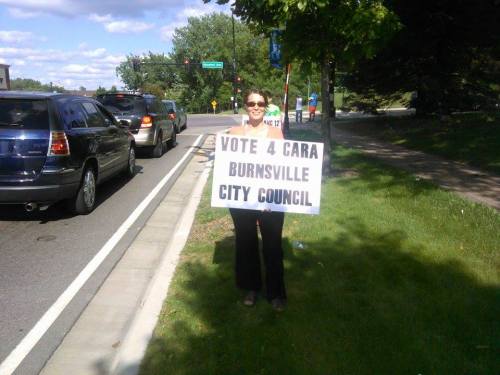 It seemed a bit superficial, but I made sure that I looked like a city council member every time I left my house. While you want to stay true to who you are, this is not the time to play “Freak the Mundanes.” The entire campaign is a job interview and every person who you come into contact with is your potential boss. If you have a piece of religious jewelry, wear it with pride, but make sure your shoes are polished.
It seemed a bit superficial, but I made sure that I looked like a city council member every time I left my house. While you want to stay true to who you are, this is not the time to play “Freak the Mundanes.” The entire campaign is a job interview and every person who you come into contact with is your potential boss. If you have a piece of religious jewelry, wear it with pride, but make sure your shoes are polished.
I wanted people to know that I am professional, approachable, and open to diverse points of views. I made sure my appearance and body language matched that message. While my religion is important to me, I had no intention of pushing it on others, so my appearance reflected that point as well.
Last of all, I wrote down several contingency plans. If X happens, I will do A, B, C, and D. If Y happens, I will do E, F, G, and H. By writing every portion of them down, I was able to act quickly, rather than being frozen.
I realized it’s a legitimate question for people or media to ask how my religious views would affect the way I perform in office. Or to ask me what my ethics are and how my religion shaped them. In my case, I could answer that my religion helped invent Western democracy and concepts like a jury trial. My ethics can be found in the 10 Precepts of Solon, examples of which are: Don’t associate with people who do bad things and When asked for advice, don’t say what’s most pleasing, but what’s most helpful. These are questions I was asked by people, and because I was able to answer them in a simple and direct way, people came away reassured that we had common ground. Because we do.
Despite all my preparations, when it finally happened, I was deeply hurt. I was surprised at how hurt and upset I was. It was three weeks before the election, and I knew this was the prime time for a hit piece. There had been behind the scenes whispers about my religion for a few weeks, but nothing I could openly address. The key to a successful hit piece is to the hit the other person and not leave them time to hit you back. You want a knock out punch, or at the very least, you want to create a situation that eats up all their time. Ideally, you have a supporter deliver the knockout punch so you can keep your hands clean.
In my case, a Letter to the Editor titled Intriguing information about Cara Schulz appeared in the local paper by an area resident. It was carefully crafted to not make any outright statements ridiculing me or my religion, but spent a great deal of time othering me and then noting that people should vote for “…Bill Coughlin and Dan Kealey, who are not pagans, but longtime Burnsville residents who understand all the responsibilities and duties as members of the City Council.”
The letter also inferred that I had been trying to hide my religion, which the writer had only discovered through research. This suggested that I could not be trusted, as opposed to my opponents, who were trustworthy, qualified and not Pagans. Vote for them, don’t vote for the Pagan.
While neither of my opponents submitted the letter to the paper, one of them did use it in their campaign. I discovered this when one of his supporters forwarded a campaign email to me saying he could no longer, in good conscientious, support someone who would stoop to that level.
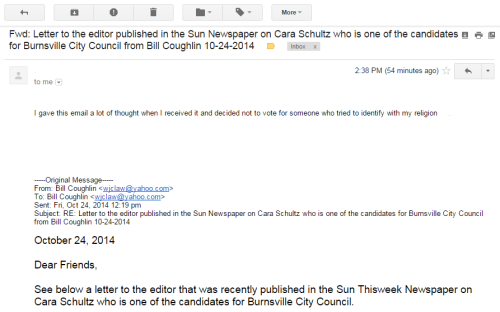
Screen cap of the forwarded email
I put one of my plan’s into action, with a few modifications. First, I issued an official statement asking my opponents and the newspaper to denounce the religious bigotry exemplified in the letter. I kept it polite, but firm, and appealed to peoples’ better natures. My supporters commented on the letter on the newspaper’s website and on social media. They, too, kept things positive.
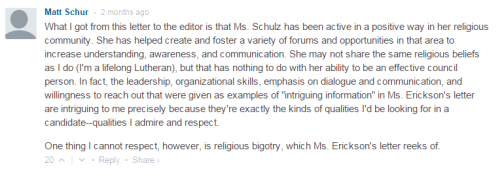
The groups and organizations who supported me, publicly restated their support for me and for religious freedom. They clearly denounced the letter as an appeal to fear and bigotry. I was interviewed by the main newspaper for the Twin Cities. I also went on a political talk radio program during a prime morning slot and had supporters ready to call in.
Part 1 of radio interview
Part 2 of radio interview
For months, I had prepared myself for this situation. When it happened, It went off smoothly and allowed me devote my time to speaking with voters rather than spinning my wheels in shock, pain, and confusion. But the real heroes of this tale are the voters.
I received countless emails and messages of support from local residents. They wanted me to know that religious bigotry was unacceptable. I was sent photos of people throwing away my opponent’s yard signs, saying they would no longer vote for him since bigotry was part of his campaign message. I was called by local clergy, letting me know they didn’t support the perspective outlined in the letter.
At the end of the day you have to trust your fellow residents. Trust them to be decent people. If you can’t do that, you have no business running for local office because you are not looking to be a servant to your community, you are looking to rule it from a position of ethical superiority. Aside from practical matters, this is the real deal breaker. Can you place your trust in your fellow residents?
I didn’t win my election. But I did everything I could to win, including knowing I had about a 5% chance of winning. I was running against two entrenched incumbents who were working together; who split costs and volunteers. They fundraised together and even dropped each other’s lit. (lit dropping is when they drive around and stick flyers in your mailbox) I can say, however, that I made them work for that reelection and I almost pulled off a win.
Yet I certainly didn’t lose.
From a selfish perspective I made many new and lasting friends – good, caring people who care passionately about their communities. I also have laid a solid foundation for the next time I run for city council. There’s a reason so few rookies win elections. You are building everything from scratch and making costly mistakes in time and resources. The second time you run, your starting point is much further ahead. Plus, you can save money by reusing your yard signs.
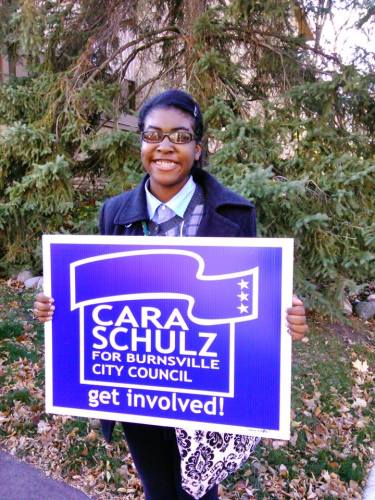
Tyra, a Burnsville high school student, on the campaign trail.
From a much less selfish perspective, my time campaigning helped change peoples’ perspectives about Paganism. I had people tell me they originally thought Pagans were teen girls who were going through a phase, but now they think of Pagans as just like anyone else.
Many of them saw me in the candidate forum. They may have met me at the community parade, or when I knocked on their door. It’s so much harder to negatively stereotype a group after you have had positive interactions with a member of that group. I have supporters from all different age groups, religious backgrounds, socio-economic levels, and political parties.
What gives me the most satisfaction is that I’ve had six Pagans from across the country contact me and tell me that they followed my campaign with interest and were considering running for office. They were hesitant, wondering if it was possible for a Pagan candidate to survive the campaign and to actually win. After following my process and seeing what happened, they are going ahead with their campaigns for the 2015 and 2016 election cycle. They now believe it is possible for Pagan candidates to be elected to political office. I’ve been working with them on how to prepare their campaign and to be ready for the inevitable #politricks.
If you’re interested in taking the plunge, contact me. No matter your political beliefs, I’ll help you create your contingency plans so you’re ready when someone tries to make your religion the focus of your campaign.
With planning and good fortune, you can win, too.
The Wild Hunt is not responsible for links to external content.
To join a conversation on this post:
Visit our The Wild Hunt subreddit! Point your favorite browser to https://www.reddit.com/r/The_Wild_Hunt_News/, then click “JOIN”. Make sure to click the bell, too, to be notified of new articles posted to our subreddit.
Yay for pagans running, and yay for you! I’ve done it twice, and didn’t win either, but I know I’ve influenced the local conversation on many topics. Luckily I didn’t get attacked for being heathen, but I live in Nevada, a very libertarian place where identity categories aren’t as much of an issue in politics as they can be elsewhere. I only know of one time when it was even an issue, when a local group decided not to endorse my campaign, and I only know about it because one of my supporters told me about it because she was upset on my behalf– and she was at the time the chairman of the county Republican Party. Nevada is different. But like you, I would also encourage pagans and heathens to run for local office, because as you pointed out, even if they don’t win the election, it can still be a win both for the individual and the community. So… (knowing my answer would be an emphatic no) are you going to run again?
I can’t say for 100% (need to talk to family and read omens) but yes, I do believe I’ll run again.
Cara – I think your points are extremely well made and timely. Pagans often complain when we are “othered” and yet so many of us resist becoming involved in local civic activities. I have long been an advocate of “everyday interfaith”…. fighting discrimination by becoming known and valued in your community. It is hard to hate someone who is invaluable to you and your community.
While every year I get a “draft Kirk to run” pull from local community members (and I may still at some point), I have chosen for now a different route that might work for those Pagans who want to make a difference but don’t want to run for elected office. Instead, I joined and became president/ chair of all of the following; my local business association/ chamber of commerce, the Rotary Club, the Freemason lodge, the Democratic committee, and the local community revitalization committee. In short, I became one of the people who the elected officials turn to for input and opinion. If Pagans want to have a voice in their communities they have to work for it one way or another. But we need people to do so. Thank you Cara for leading the way and guiding others who may want to do likewise.
Well, look at the bright side.
Since you didn’t win, you’re not bound by the Halloran Protocols.
Therefore you’re not required to publically declare a graft and corruption index point, the dollar amount where your vote is for sale.
Nor declare a preferred institution of incarceration if you’re convicted of committing such a crime.. 😉
Thanks for running and for sharing your experience. Speaking as a hospital chaplain ordained through a mainstream Christian denomination, I agree that we need more diversity in public office on all levels — perhaps religious diversity in particular.